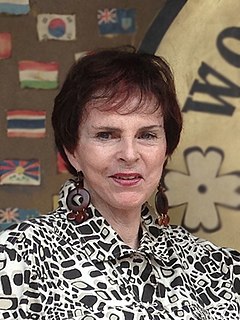A Quote by Chris Hedges
I think most generations tend to learn the lesson of war the hard way. There is a deep attraction to the empowerment. Freud is right: societies either become locked in a collective embrace of Eros, as individuals do, or a collective embrace of Thanatos, the death instinct. They swing between the two. The notion that societies are naturally prone toward self-preservation is wrong. Self-annihilation can be deeply addictive, intoxicating, enticing. So I take a darker view of human nature, that war is probably always going to be with us. I think history bears me out.
Quote Topics
Addictive
Always
Annihilation
Attraction
Bears
Become
Between
Collective
Darker
Death
Deep
Deeply
Either
Embrace
Empowerment
Enticing
Eros
Generations
Going
Hard
Hard Way
History
Human
Human Nature
Individuals
Instinct
Intoxicating
Learn
Lesson
Locked
Me
Most
Naturally
Nature
Notion
Out
Preservation
Prone
Right
Self
Self-Preservation
Societies
Swing
Take
Tend
Thanatos
Think
Toward
Two
Us
View
War
Way
Wrong
Related Quotes
The 'coming of the Self' is immanent; and the process of collective 'individuation' is living itself out in human history. One way or another, the world is going to be made a single whole entity. But it will be unified either in mutual mass destruction or by means of mutual human consciousness. If a sufficient number of individuals can have the experience of the coming of the Self as an individual, inner experience, we may just possibly be spared the worst features of its external manifestation.
For most of history, war has been a more or less functional institution, providing benefits for those societies that were good at it, although the cost in money, in lives, and in suffering was always significant. Only in the past century have large numbers of people begun to question the basic assumption of civilized societies that war is inevitable and often useful.
The human instinct for self-preservation is strong. I know, because mine pulls at me, too, like the needle on a compass. And everybody - I've been reading some philosophy - everybody seems to agree that the instinct and responsibility of all humans is to take care of themselves first. You have the right to self-defense. You have the right to survive, if you can.
Dissident Natan Sharansky writes that there are two kinds of states - “fear societies” and “free societies.”… The two societies make up two kinds of consciousness. The consciousness derived of oppression is despairing, fatalistic, and fearful of inquiry. It is mistrustful of the self and forced to trust external authority. It is premised on a dearth of self-respect. It is cramped …
In contrast, the consciousness of freedom … is one of expansiveness, trust of the self, and hope. It is a consciousness of limitless inquiry … It builds up in a citizen a wealth of self-respect.
We view Sufism not as an ideology that molds people to the right way of belief or action, but as an art or science that can exert a beneficial influence on individuals and societies, in accordance with the needs of those individuals and societies ... Sufi study and development gives one capacities one did not have before.
War is a great destroyer. And human history has arrived at a pivotal moment. We can choose a path built on cooperation, where our caring and sharing side uplifts us, or we can continue to embrace a worldview where domination using violence imprisons us in cycles of killing and destruction. I'm a biologist, and war is not genetically fixed. War is a cultural invention. It's time to end this abomination, and this World Beyond War movement is uniquely focused on unifying the human community to create one of the biggest revolutions in history. I'm in. Join us!
I think we need to find a way to provide people with a reason that the average man on the street can grasp and embrace, that would cause him to move away from the centuries-old idea of the individual and individualism, and move toward a different concept of what it means to be human in a collective society. Unless he has that reason, unless he has a fundamental reason to do that, it's going to be very difficult to cause him to make that shift, in my view.
The main characteristic of collectivism is that it does not take notice of the individual's will and moral self-determination. In the light of its philosophy the individual is born into a collective and it is "natural" and proper for him to behave as members of this collective are expected to behave. Expected by whom? Of course, by those individuals to whom, by the mysterious decrees of some mysterious agency, the task of determining the collective will and directing the actions of the collective has been entrusted.
What I mean by the common good is that we understand we're all part of something bigger than ourselves, that we live in societies together and must help take care of one another because you never know when you're going to need to be taken care of by others. And it's not enough to say that your family or your church is going to take care of you. Societies are collective entities, we're meant to be connected to one another; the function of government is to administer that connection.

































